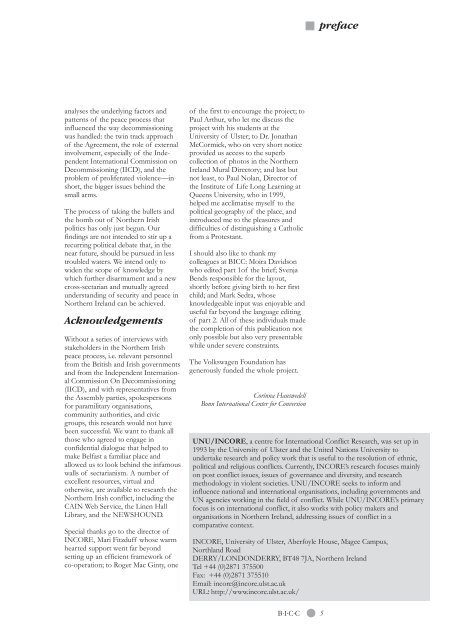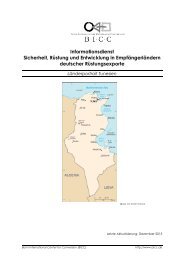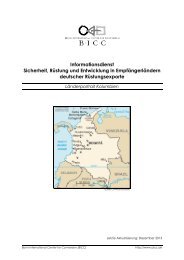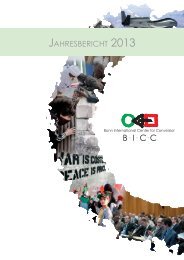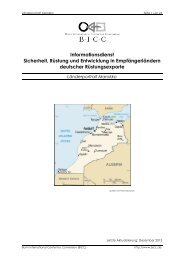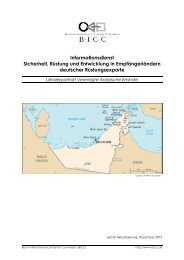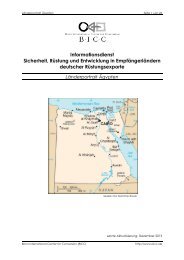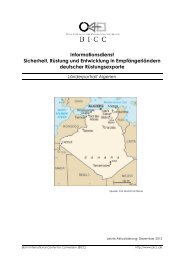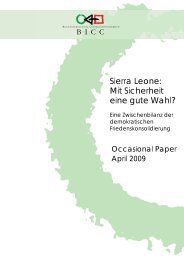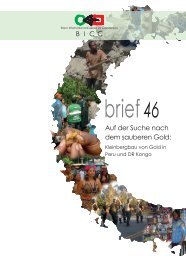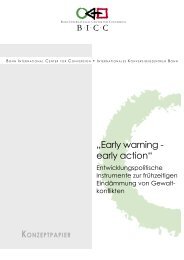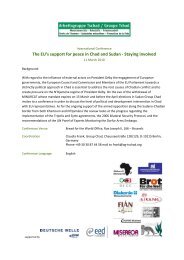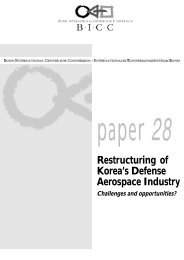English - BICC
English - BICC
English - BICC
Create successful ePaper yourself
Turn your PDF publications into a flip-book with our unique Google optimized e-Paper software.
analyses the underlying factors and<br />
patterns of the peace process that<br />
influenced the way decommissioning<br />
was handled: the twin track approach<br />
of the Agreement, the role of external<br />
involvement, especially of the Independent<br />
International Commission on<br />
Decommissioning (IICD), and the<br />
problem of proliferated violence—in<br />
short, the bigger issues behind the<br />
small arms.<br />
The process of taking the bullets and<br />
the bomb out of Northern Irish<br />
politics has only just begun. Our<br />
findings are not intended to stir up a<br />
recurring political debate that, in the<br />
near future, should be pursued in less<br />
troubled waters. We intend only to<br />
widen the scope of knowledge by<br />
which further disarmament and a new<br />
cross-sectarian and mutually agreed<br />
understanding of security and peace in<br />
Northern Ireland can be achieved.<br />
Acknowledgements<br />
Without a series of interviews with<br />
stakeholders in the Northern Irish<br />
peace process, i.e. relevant personnel<br />
from the British and Irish governments<br />
and from the Independent International<br />
Commission On Decommissioning<br />
(IICD), and with representatives from<br />
the Assembly parties, spokespersons<br />
for paramilitary organisations,<br />
community authorities, and civic<br />
groups, this research would not have<br />
been successful. We want to thank all<br />
those who agreed to engage in<br />
confidential dialogue that helped to<br />
make Belfast a familiar place and<br />
allowed us to look behind the infamous<br />
walls of sectarianism. A number of<br />
excellent resources, virtual and<br />
otherwise, are available to research the<br />
Northern Irish conflict, including the<br />
CAIN Web Service, the Linen Hall<br />
Library, and the NEWSHOUND.<br />
Special thanks go to the director of<br />
INCORE, Mari Fitzduff whose warm<br />
hearted support went far beyond<br />
setting up an efficient framework of<br />
co-operation; to Roger Mac Ginty, one<br />
of the first to encourage the project; to<br />
Paul Arthur, who let me discuss the<br />
project with his students at the<br />
University of Ulster; to Dr. Jonathan<br />
McCormick, who on very short notice<br />
provided us access to the superb<br />
collection of photos in the Northern<br />
Ireland Mural Directory; and last but<br />
not least, to Paul Nolan, Director of<br />
the Institute of Life Long Learning at<br />
Queens University, who in 1999,<br />
helped me acclimatise myself to the<br />
political geography of the place, and<br />
introduced me to the pleasures and<br />
difficulties of distinguishing a Catholic<br />
from a Protestant.<br />
I should also like to thank my<br />
colleagues at <strong>BICC</strong>: Moira Davidson<br />
who edited part 1of the brief; Svenja<br />
Bends responsible for the layout,<br />
shortly before giving birth to her first<br />
child; and Mark Sedra, whose<br />
knowledgeable input was enjoyable and<br />
useful far beyond the language editing<br />
of part 2. All of these individuals made<br />
the completion of this publication not<br />
only possible but also very presentable<br />
while under severe constraints.<br />
The Volkswagen Foundation has<br />
generously funded the whole project.<br />
Corinna Hauswedell<br />
Bonn International Center for Conversion<br />
B·I·C·C<br />
preface<br />
UNU/INCORE, a centre for International Conflict Research, was set up in<br />
1993 by the University of Ulster and the United Nations University to<br />
undertake research and policy work that is useful to the resolution of ethnic,<br />
political and religious conflicts. Currently, INCORE’s research focuses mainly<br />
on post conflict issues, issues of governance and diversity, and research<br />
methodology in violent societies. UNU/INCORE seeks to inform and<br />
influence national and international organisations, including governments and<br />
UN agencies working in the field of conflict. While UNU/INCORE’s primary<br />
focus is on international conflict, it also works with policy makers and<br />
organisations in Northern Ireland, addressing issues of conflict in a<br />
comparative context.<br />
INCORE, University of Ulster, Aberfoyle House, Magee Campus,<br />
Northland Road<br />
DERRY/LONDONDERRY, BT48 7JA, Northern Ireland<br />
Tel +44 (0)2871 375500<br />
Fax: +44 (0)2871 375510<br />
Email: incore@incore.ulst.ac.uk<br />
URL: http://www.incore.ulst.ac.uk/<br />
5


